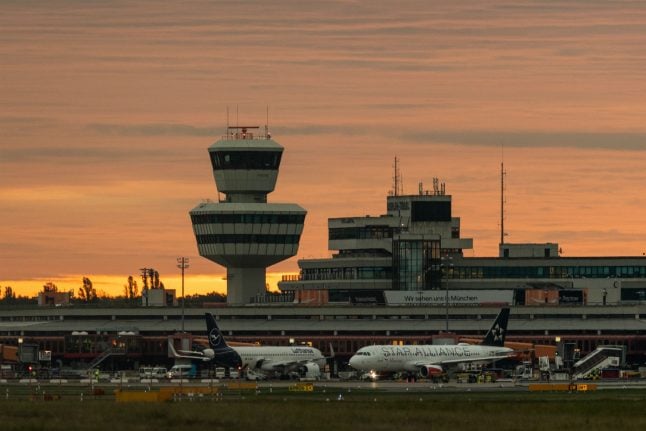FLIGHTS
Flights in Germany to ‘radically decrease’ in 2020
German airports can expect a decline in flights and passenger numbers in 2020, according to a forecast by the German Airports Association (ADV).
Published: 3 January 2020 09:46 CET

Berlin's Tegel airport, which is slated to close on November 8th, 2020. Photo: DPA
“Air traffic in Germany will not be able to maintain the growth path of recent years in 2020,” ADV CEO Ralph Beisel told the Frankfurter Allgemeine Zeitung (FAZ) on Thursday. “The outlook for the new year 2020 is gloomy.”
The association expects 0.7 percent fewer passengers and 2.9 percent fewer take-offs and landings in 2020, reported FAZ.
“The harsh market environment, characterized by rising kerosene prices and insolvencies, is also driving airlines to radically thin out their flight schedules,” the ADV said.
Germany's air transport tax is also set to rise significantly from April as part of a political push to disincentive taking cheap inter-European flights rather than trains.
READ ALSO: The big changes in Germany to expect in 2020
In 2019, the number of air passengers rose only slightly to 244.7 million, missing the original forecast of 2.7 percent growth – which would have brought the total figure to 250 million passengers.
“In fact, the traffic development already saw a [downward] shift in the summer and even slipped into the red with the route cancellations in the winter flight schedule,” said Beisel.
Passenger record in Berlin
There was, however, a passenger record at the Berlin airports Tegel and Schönefeld in 2019.
Around 35.5 million passengers have travelled via Tegel and Schönefeld in the past twelve months, announced airport boss Engelbert Lütke Daldrup.
This means that the number of passengers in the capital has grown by 2.2 percent. There were approximately 24.2 million passengers at Tegel Airport, while the number at Schönefeld was 11.3 million.
Berlin's new airport BER is scheduled to open on October 31st, nine years after its projected opening date.
Daldrup predicted that that this will be accompanied by a significant growth in intercontinental connections.
After the opening of BER, Tegel Airport is set to close eight days later.
Vocabulary
air traffic – (der) Luftverkehr
gloomy/dismal – düster
growth trajectory – (der) Wachstumspfad
thin out – ausdünnen
missed – verfehlt
We're aiming to help our readers improve their German by translating vocabulary from some of our news stories. Did you find this article useful? Let us know.
Url copied to clipboard!


 Please whitelist us to continue reading.
Please whitelist us to continue reading.
Member comments